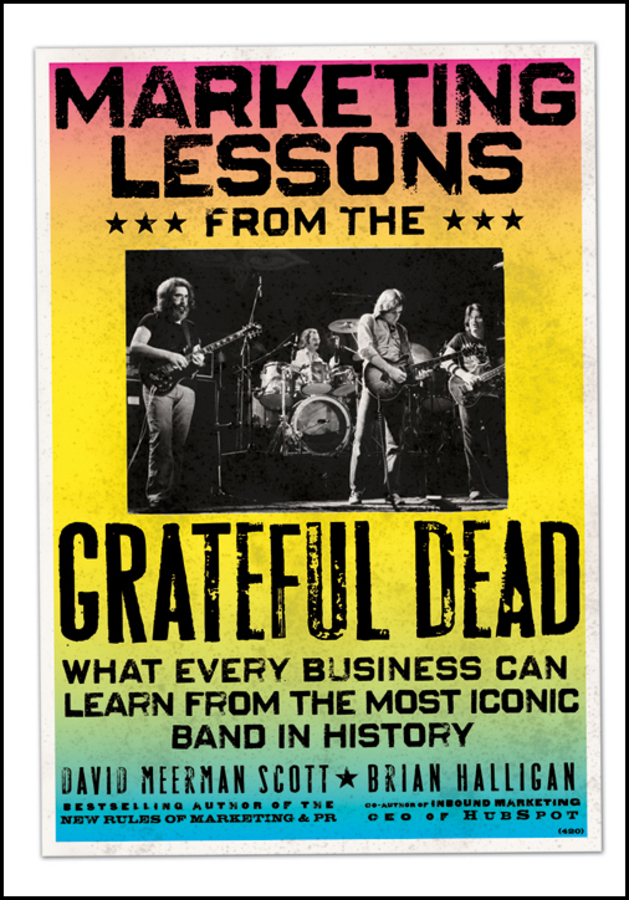Author David Meerman Scott and Brian Halligan, CEO of Hubspot, have a new book out that’s generating a lot of Buzzzzzzzzz …
David and I have known each other since 2005. Since that time he’s written several great books including the international bestseller “The New Rules of Marketing and PR: How To Use News Releases, Blogs, Podcastiing, Viral Marketing & Online Media to Reach Buyers Directly,” which has been translated into 26 languages.
David’s writing is crisp, clean, easy to read and always full of helpful information and unique ways to authentically connect with people—and grow your business. That’s hard to pull off.
WRONG
I’m usually 100% supportive of David’s ideas and insights. Not this time. I think he and Brian got it totally wrong on the name and naming of the “Grateful Dead.”
RESEARCH
They must not have done their research. Had they done in-depth historical musical research, they would have uncovered where the Grateful Dead name really came from.
THE SECRET
As a business courtesy (back-stabbing) to David and Brian, it will be revealed here for the first time. That’s right. The real secret behind the naming of The Grateful Dead. Maybe David and Brian can correct their story in the second printing of the book to give credit where credit is due.
ALL FAIRNESS ASIDE
But, in all fairness, I’ll let them make their case first. Then I’ll expose their inaccuracies. Rip them to shreds. Professionally of course. But be prepared – some graphic pictures are coming your way. It may not be suitable for all readers. Make sure any kids under 50 are not in the room when you read this.
THEIR CASE …
A Marketing Lesson from the Grateful Dead – Choose Memorable Brand Names
By David Meerman Scott and Brian Halligan
The Grateful Dead.
If you stop to think about it, the name is sorta weird. Even a little scary.
But boy is it memorable.
Originally calling themselves The Warlocks when they formed in 1964, members of the band realized they needed to come up with a new name a year later when they found out that there was another band by the same name that had recorded a single. The guys debated names, suggesting ideas such as “Mythical Ethical Icicle Tricycle” (Garcia) and “His Own Sweet Advocates” (Weir). When they were unable to find a name they agreed on, they gathered at Phil Lesh’s house around a copy of Bartlett’s Quotations, read out a thousand possible names, but couldn’t agree on anything. Then Jerry Garcia opened a copy of Funk and Wagnall’s New Practical Standard Dictionary (1956 edition) and randomly pointed to a page. There, staring back at him, was GRATEFUL DEAD. Several members immediately fell in love with the name and wanted to use it. Others were a bit wary. But all agreed it was memorable so they decided to use it.
Love it, hate it, or don’t understand it—the Grateful Dead is a name that you remember.
A name–like the Grateful Dead–is an asset to an organization choosing wisely. When you select an uncommon name (and one appropriate to your company image and target market) it’s unlikely that consumers will confuse your product with something similar. They will remember you. And in today’s world of online communications and of search engines, unique names for your company, products, and services allow you to own the search engine results for your brands.
Most companies don’t focus enough attention on choosing a memorable name or to the importance of Google, Bing, and other search engines when selecting those names. Typically people closest to the product development effort are the ones proposing the candidate names. This usually leads to overly technical names focused on what a product does (something like “MP3 Deluxe Pocket Player” rather than a memorable name that appeals to customers like “iPod”). At most companies, candidate names are vetted by the legal department for copyright and trademark issues that would disqualify use, but few bother to do a Google search on the potential new name. If your company’s website is not on the first page of the Google results with your product name, that should disqualify it as an option.
Naming is tough. But it is a very important element of marketing. Most organizations don’t spend enough time on this important activity.
Action: Here are some things to keep in mind and a few tricks you might try as you think of a name:
- Avoid common names and names that are already used as a title of a popular movie or book. You will want to have a name that you can have the top listing for in the search engines.
- Use search engines before finalizing a name. You don’t want to fall in love with a name that you cannot have the top search results for.
- Find inspiration in unlikely places. Why not go to one of the online booksellers (such as Amazon.com, BN.com, or Borders.com in the US) and search on the name of the category of product you are trying to name. You’ll see a list of book titles and subtitles that may spark an idea.
- Many people choose made up words as a name. This is great because you can own the search results. But try not to choose one that is too esoteric or difficult to pronounce if you go this route.
- You might take two words that are very different and put them together as one word like SurveyMonkey, an intriguing company name.
- Try an alternative spelling for a word. Google is a derivation of the word “googol,” a number that is ten to the power of one hundred (the numeral one followed by 100 zeros). Flickr is “flicker” with an “e” removed.
- In her excellent book POP!, Sam Horn (http://www.samhorn.com) talks about what she calls “alphabetizing” common words to come up with a name. We like this technique. Take a common product you want to name, for example, Yogurt in a squeeze tube. Then go through every letter in the alphabet and substitute it for the “Y” in Yogurt and presto: “GoGurt” is born.
- Take a common name and change it slightly to create a new word. For example social networking site FledgeWing is a derivation of the word “fledgling.”
END OF THEIR CASE – NOW IT’S MY TURN
That’s history as it’s recorded. The mythological muses smile on Jerry Garcia and the band and out POPS the name The Grateful Dead. It’s true that the name is memorable. But history is always written by the victors – biased biographies of the victorious.
THE REST OF THE STORY ( I’m sure Paul Harvey did this story once)
The real story was that there was this kick-butt band called “The Grateful Donk” that Jerry Garcia and the boys saw play at the Donkey Dewd Don’t You Drop Inn bar in Haight-Asbury in 1964. They were mesmerized – especially by the melodiously mellifluous kilt-wearing piano player and the talented Equus Africanus (Ass) lead guitarist.
David and Brian should have made full disclosure on this issue – they were there. Check out the picture. Really. It’s not “Where’s Waldo“; Brian and David are herein both graphically exposed.
EXPOSED
And being exposed was actually the downfall of this once-mighty band with so much potential. See the kilt-wearing piano player above? See how he’s rocking out doing his smoking best Jerry Lee Lewis ivory-licks? See the Grateful Donk fans in the front row? I mean the shocked, horrified and distressed-looking ones?
Well … getting to the bottom of it, the piano player, he uh, forgot something. Went kilt-kommando so to speak.
And you know that name?The Grateful Donk?
Love it, hate it, or don’t understand it—The Grateful Donk is a name that you remember
RUINED
Well it wasn’t. The band was ruined by the exposure.
The Grateful Donk tried to regroup. They killed the kilt guy, then added a female singer and guitarist named
BONNIE BRAY-IT
But the band never recovered from the kommando-kilt incident.
Jerry Garcia and the boys cribbed the name and stole the glory after the
band fled in utter disgrace and had to disband.
The kommando-kilt wearing piano player, (much like Boston’s Bill Buckner, after “The Curse of the Bambino” caused him to boot a ball in game six, and it cost the Boston the 1986 World Series,) took the disgrace like a manly man.
 Forty years later he regrouped and now works in PR and Marketing for a software company.
Forty years later he regrouped and now works in PR and Marketing for a software company.
And now you know … the rest of the story.
Epilogue:
The Equus Africanus (ass) lead guitarist later went on to great literary fame … his name? Donkey O’Tee, author of ;
and he married? You guessed it …
###
The good stuff above was excerpted from the new book (to be published August 1, 2010 by John Wiley & Sons) Marketing Lessons from the Grateful Dead: What Every Business Can Learn from the Most Iconic Band in History by David Meerman Scott and Brian Halligan. ISBN-13: 978-0470900529. Used with permission.
The Grateful Donk stuff, though historically, solidly questionable, has nothing to do with David and Brian’s new book. Go check their book out for yourself.
Visit David Meerman Scott and Brian Halligan at their Facebook Fan Page for more information on “Marketing Lessons for the Grateful Dead.”
And listen to the Grateful Donk Radio on the Blip.fm History Channel – Http://blip.fm/TheGratefulDonk no courtesy of investigative reporter @stevekayser on Twitter or Steve on Blip.fm at http://blip.fm/stevekayser



![Kilt Kommando small[3]](https://stevekayser.com/wp-content/uploads/2010/07/Kilt-Kommando-small3-480x408.jpg)





Recent Comments
Lessons Learned from Hollywood STORY Guru Robert McKee